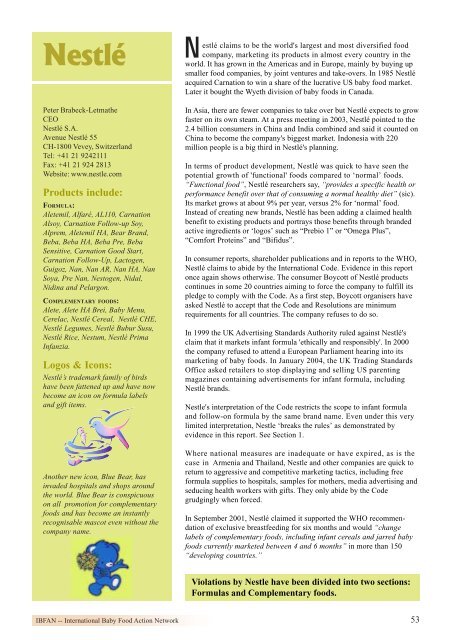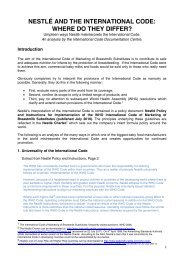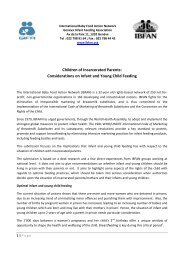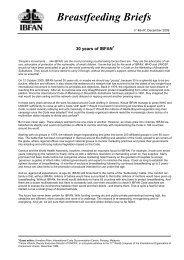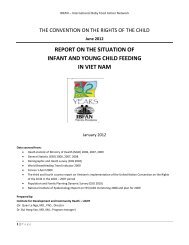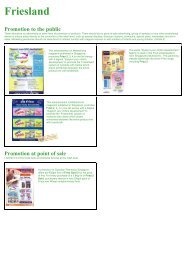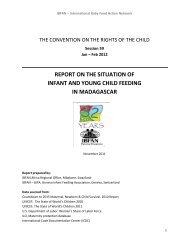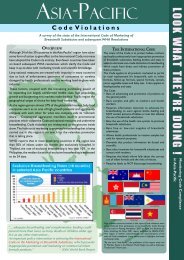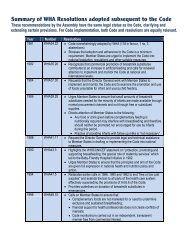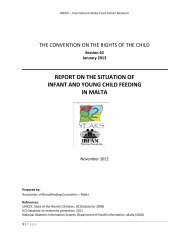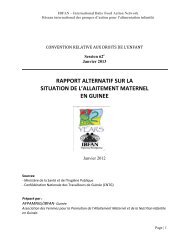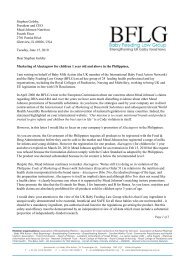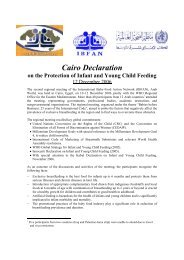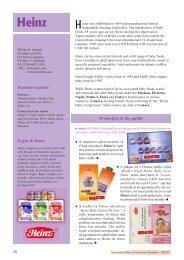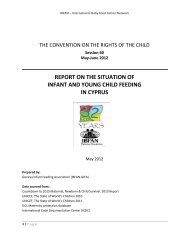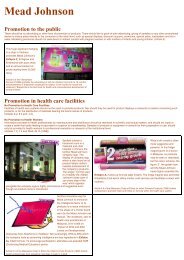Create successful ePaper yourself
Turn your PDF publications into a flip-book with our unique Google optimized e-Paper software.
Nestlé<br />
Peter Brabeck-Letmathe<br />
CEO<br />
Nestlé S.A.<br />
Avenue Nestlé 55<br />
CH-1800 Vevey, Switzerland<br />
Tel: +41 21 9242111<br />
Fax: +41 21 924 2813<br />
Website: www.nestle.com<br />
Products include:<br />
FORMULA:<br />
Aletemil, Alfaré, AL110, Carnation<br />
Alsoy, Carnation Follow-up Soy,<br />
Alprem, Aletemil HA, Bear Brand,<br />
Beba, Beba HA, Beba Pre, Beba<br />
Sensitive, Carnation Good Start,<br />
Carnation Follow-Up, Lactogen,<br />
Guigoz, Nan, Nan AR, Nan HA, Nan<br />
Soya, Pre Nan, Nestogen, Nidal,<br />
Nidina and Pelargon.<br />
COMPLEMENTARY FOODS:<br />
Alete, Alete HA Brei, Baby Menu,<br />
Cerelac, Nestlé Cereal, Nestlé CHE,<br />
Nestlé Legumes, Nestlé Bubur Susu,<br />
Nestlé Rice, Nestum, Nestlé Prima<br />
Infanzia.<br />
Logos & Icons:<br />
Nestlé’s trademark family of birds<br />
have been fattened up and have now<br />
become an icon on formula labels<br />
and gift items.<br />
Another new icon, Blue Bear, has<br />
invaded hospitals and shops around<br />
the world. Blue Bear is conspicuous<br />
on all promotion for complementary<br />
foods and has become an instantly<br />
recognisable mascot even without the<br />
company name.<br />
<strong>IBFAN</strong> -- International Baby Food Action Network<br />
N estlé claims to be the world's largest and most diversified food<br />
company, marketing its products in almost every country in the<br />
world. It has grown in the Americas and in Europe, mainly by buying up<br />
smaller food companies, by joint ventures and take-overs. In 1985 Nestlé<br />
acquired Carnation to win a share of the lucrative US baby food market.<br />
Later it bought the Wyeth division of baby foods in Canada.<br />
In Asia, there are fewer companies to take over but Nestlé expects to grow<br />
faster on its own steam. At a press meeting in 2003, Nestlé pointed to the<br />
2.4 billion consumers in China and India combined and said it counted on<br />
China to become the company's biggest market. Indonesia with 220<br />
million people is a big third in Nestlé's planning.<br />
In terms of product development, Nestlé was quick to have seen the<br />
potential growth of 'functional' foods compared to ‘normal’ foods.<br />
“Functional food”, Nestlé researchers say, “provides a specific health or<br />
performance benefit over that of consuming a normal healthy diet” (sic).<br />
Its market grows at about 9% per year, versus 2% for ‘normal’ food.<br />
Instead of creating new brands, Nestlé has been adding a claimed health<br />
benefit to existing products and portrays those benefits through branded<br />
active ingredients or ‘logos’ such as “Prebio 1” or “Omega Plus”,<br />
“Comfort Proteins” and “Bifidus”.<br />
In consumer reports, shareholder publications and in reports to the WHO,<br />
Nestlé claims to abide by the International Code. Evidence in this report<br />
once again shows otherwise. The consumer Boycott of Nestlé products<br />
continues in some 20 countries aiming to force the company to fulfill its<br />
pledge to comply with the Code. As a first step, Boycott organisers have<br />
asked Nestlé to accept that the Code and Resolutions are minimum<br />
requirements for all countries. The company refuses to do so.<br />
In 1999 the UK Advertising Standards Authority ruled against Nestlé's<br />
claim that it markets infant formula 'ethically and responsibly'. In 2000<br />
the company refused to attend a European Parliament hearing into its<br />
marketing of baby foods. In January 2004, the UK Trading Standards<br />
Office asked retailers to stop displaying and selling US parenting<br />
magazines containing advertisements for infant formula, including<br />
Nestlé brands.<br />
Nestle's interpretation of the Code restricts the scope to infant formula<br />
and follow-on formula by the same brand name. Even under this very<br />
limited interpretation, Nestle ‘breaks the rules’ as demonstrated by<br />
evidence in this report. See Section 1.<br />
Where national measures are inadequate or have expired, as is the<br />
case in Armenia and Thailand, Nestle and other companies are quick to<br />
return to aggressive and competitive marketing tactics, including free<br />
formula supplies to hospitals, samples for mothers, media advertising and<br />
seducing health workers with gifts. They only abide by the Code<br />
grudgingly when forced.<br />
In September 2001, Nestlé claimed it supported the WHO recommendation<br />
of exclusive breastfeeding for six months and would “change<br />
labels of complementary foods, including infant cereals and jarred baby<br />
foods currently marketed between 4 and 6 months” in more than 150<br />
“developing countries.”<br />
Violations by Nestle have been divided into two sections:<br />
Formulas and Complementary foods.<br />
53


